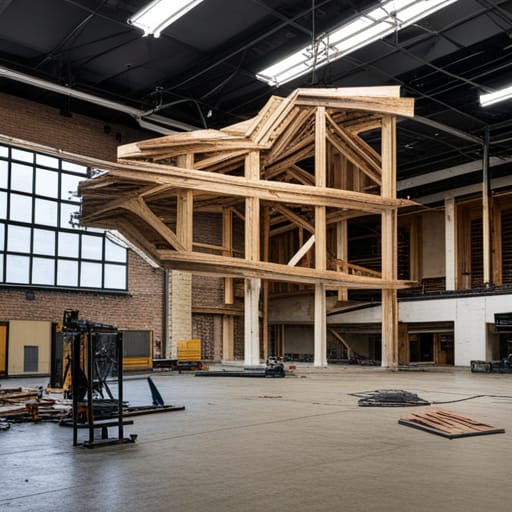
In the world of poststructuralism, language dances to a different tune—a melody of multiple interpretations, playfulness, and perpetual uncertainty. Rather than seeking universal truths, poststructuralists reveled in the kaleidoscope of meanings, emphasizing the inherent instability of language and the myriad ways in which power shapes discourse.
Binary oppositions crumbled under their scrutiny as they exposed the contradictions and complexities within texts, cultural norms, and social systems. They unmasked the invisible hand of power and challenged the established hierarchies that dictate our understanding of reality.
🏗️Introduction
Poststructuralism and deconstruction are two interrelated philosophical approaches that have captivated scholars and intellectuals alike, offering fresh perspectives on language, culture, and the construction of reality. In this blog post, we will delve into the fascinating world of poststructuralism and deconstruction, exploring their origins, key concepts, and their profound impact on various fields of study.
Origins and Context
Emerging in the mid-20th century, poststructuralism and deconstruction were deeply influenced by the works of French philosophers such as Jacques Derrida, Michel Foucault, and Jean Baudrillard.
These movements were born out of dissatisfaction with structuralist approaches that sought to uncover universal truths and stable systems of meaning.
Poststructuralism and deconstruction aimed to challenge the notion of fixed meanings, emphasizing the inherent instability and ambiguity of language.
Key Concepts
Just as the structuralist empire seemed invincible, a formidable challenger emerged from the shadows. Enter poststructuralism, the rebel with a cause, ready to dismantle the seemingly impenetrable structures constructed by its predecessor.
Language as a System of Differences
Poststructuralism argues that language is not simply a transparent tool for communication but a complex web of signs and symbols. According to theorists like Ferdinand de Saussure, meaning is created through a system of differences, where words gain significance in relation to other words.
Poststructuralists emphasize the idea that meaning is never fixed and can shift depending on context and interpretation.
Deconstruction
Deconstruction, a key method within poststructuralism, aims to uncover the hidden assumptions and contradictions in texts. Deconstruction seeks to dismantle hierarchical binary oppositions, such as male/female, presence/absence, or nature/culture, by showing that these distinctions are not stable or inherent but are constructed through language.
Jacques Derrida famously explored deconstruction, emphasizing the play of differences and the unending process of interpretation.
Power and Discourse
Poststructuralism also examines the role of power in shaping language and knowledge.
Michel Foucault’s ideas on power knowledge highlight how power operates through discourse, shaping what is considered normal, acceptable, or true within a given society. Poststructuralists critically analyze power dynamics, exposing how certain discourses marginalize and exclude particular groups or perspectives.
Subjectivity and Identity
Poststructuralism challenges the notion of a fixed and unified subject. Instead, it suggests that subjectivity is fragmented and fluid, influenced by social, historical, and linguistic forces. Poststructuralists explore how identities are constructed and performative, examining the ways in which power structures shape individual and collective identities.
Impact and Influence
Poststructuralism and deconstruction have left an indelible mark on various disciplines, including philosophy, literary theory, cultural studies, and social sciences.
These approaches have revolutionized the way we think about language, culture, and knowledge. In literary studies, deconstruction has opened new avenues of interpretation, revealing the multiplicity of meanings within texts.
In cultural studies, poststructuralism has challenged dominant narratives and shed light on power relations within society. Furthermore, poststructuralist ideas have influenced fields such as feminism, queer theory, and postcolonial studies, providing frameworks to analyze social structures and identities.
Structuralism And Poststructuralism
Structuralism and poststructuralism are two distinct philosophical approaches that emerged in the 20th century. While both share an interest in analyzing language and meaning, they differ significantly in their theoretical foundations and key concepts.
Compare
Structuralism, which gained prominence in the mid-20th century, focuses on uncovering underlying structures and systems that shape human thought and behavior. It emphasizes the search for universal patterns and fixed meanings.
Structuralists, such as Ferdinand de Saussure, examine language as a system of signs and symbols, asserting that meaning is derived from the relationships and differences between these signs. They seek to identify deep structures that operate across various domains of human experience, including culture, literature, and society.
Contrast
Poststructuralism, on the other hand, emerged as a critical response to structuralism. Poststructuralists, like Jacques Derrida and Michel Foucault, reject the idea of fixed meanings and stable structures. They argue that language is inherently unstable and subject to multiple interpretations.
Poststructuralism emphasizes the play of differences, the contingency of meaning, and the ways in which power operates through language and discourse. Poststructuralists question binary oppositions and challenge established hierarchies, revealing the inherent contradictions and complexities within texts, discourses, and social systems.
Summary
In summary, structuralism focuses on uncovering underlying structures and universal patterns, aiming for a fixed understanding of meaning, while poststructuralism critiques these structures, emphasizing the instability of language and the multiplicity of interpretations, highlighting the role of power and challenging established hierarchies.
Conclusion
Poststructuralism and deconstruction offer powerful tools for unraveling the intricate tapestry of language, power, and meaning. By questioning the stability of meanings, these approaches disrupt established systems and invite us to critically examine the discourses that shape our understanding of reality. While often challenging and complex, the insights gained from poststructuralism and deconstruction inspire us to question, deconstruct, and reconstruct our own assumptions, ultimately fostering a more nuanced and reflective engagement with the world around us.





